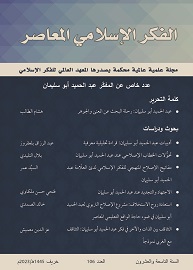Abstract
This article captures the transformations of the reformist discourse of AbdulHamid AbuSulayman by tracing the stages of development in his reformist ideas and by identifying the extent to which his reformist ideas impacted and transformed the International Institute of Islamic Thought (IIIT). The study traces the development of AbuSulayman’s reformist thought and how it shaped IIIT by focusing on four particular areas of inquiry: (1) It examines the writings of AbuSulayman, beginning with his university research and throughout his academic career, doing so chronologically and analyzing the particular issues he addressed and the trends in which his thought proceeded on these issues; (2) It analyzes the overall narrative of IIIT, since its inception and through its development: looking closely at the contributions made to this narrative by IIIT’s founding members as well as others who have contributed to shaping its mission and objectives, including AbdulHamid AbuSulayman; (3) It explores some of the major reform initiatives taken by AbuSulayman, particularly those issues pertaining to human rights and Shari’āh law (e.g., apostasy and freedom of belief, domestic violence, and the penal system in Islam); and finally (4) It attempts to understand the practical aspect of AbuSulayman’s reform project by examining its primary practical component, that of educational reform and the mechanisms he devises therein.

This work is licensed under a Creative Commons Attribution-NonCommercial-NoDerivatives 4.0 International License.
Copyright (c) 2023 المعهد العالمي للفكر الإسلامي





